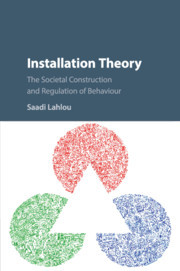Description
Installation Theory
The Societal Construction and Regulation of Behaviour
Author: Lahlou Saadi
Installation Theory provides researchers and practitioners with a simple and powerful framework to analyse and change behaviour.
Language: English
Subject for Installation Theory:
Approximative price 43.23 €
In Print (Delivery period: 14 days).
Add to cart
Installation Theory
Publication date: 06-2019
Support: Print on demand
Publication date: 06-2019
Support: Print on demand
Approximative price 156.12 €
In Print (Delivery period: 14 days).
Add to cart
Installation Theory : The Societal Construction and Regulation of Behaviour
Publication date: 02-2018
520 p. · 16.8x23.5 cm · Hardback
Publication date: 02-2018
520 p. · 16.8x23.5 cm · Hardback
Description
/li>Contents
/li>Biography
/li>
Installation Theory: The Societal Construction and Regulation of Behaviour provides researchers and practitioners with a simple and powerful framework to analyse and change behaviour. Informed by a wide range of empirical evidence, it includes an accessible synthesis of former theories (ecological psychology, activity theory, situated action, distributed cognition, social constructionism, actor-network theory and social representations). 'Installations' are the familiar, socially constructed, apparatuses which elicit, enable, scaffold and control - and make predictable most of our 'normal' behaviour; from shower-cabins or airport check-ins to family dinners, classes or hospitals. The book describes their threefold structure with a new model enabling systematic and practical analysis of their components. It details the mechanisms of their construction, resilience and evolution, illustrated with dozens of examples, from restaurants to nuclear plant operation. The book also provides a detailed analysis of the processes of creation and selection of innovations, proposing a model for the maintenance and evolution of social systems.
1. Installation: a synthetic theory to explain how humans construct systems that support and format individual behaviour; 2. The problem of human action and the problem of social regulation: two sides of the same coin; 3. Theoretical frameworks grounding installation theory; 4. The structure of installations; 5. Endurance of installations: the reconstructive cycle of practice; 6. Selection mechanisms in societal evolution: two cases, science and industry; 7. The evolution of installations; 8. Redesigning installations to change behaviour; 9. Conclusion; 10. References cited.
Saadi Lahlou is Chair in Social Psychology at the London School of Economics and Political Science, in the department of Psychological and Behavioural Science, of which he was formerly Head. Trained initially as a statistician and economist, then a student of Serge Moscovici, he developed methods in large surveys, text mining, participative design and digital ethnography. Lahlou directed the Consumer Research department of the Centre for Lifestyles and Social Policies (Crédoc, Paris), the Laboratory of Design for Cognition at EDF R&D (a whole building instrumented as a living lab), and was a member of the board of the Commissariat Général du Plan (French Prime Minister's office). He has written over 150 papers, books and published reports.
© 2024 LAVOISIER S.A.S.

